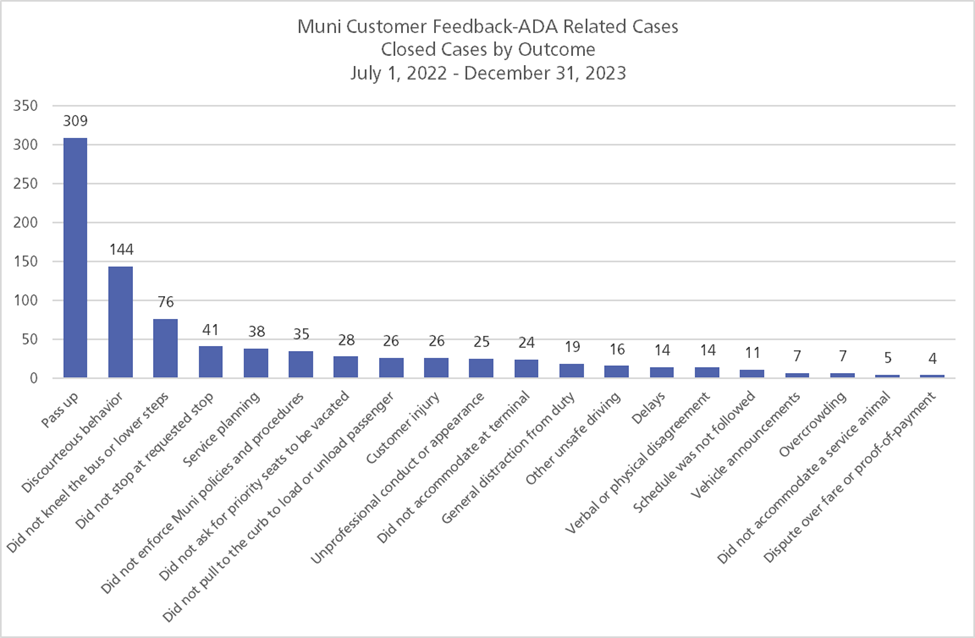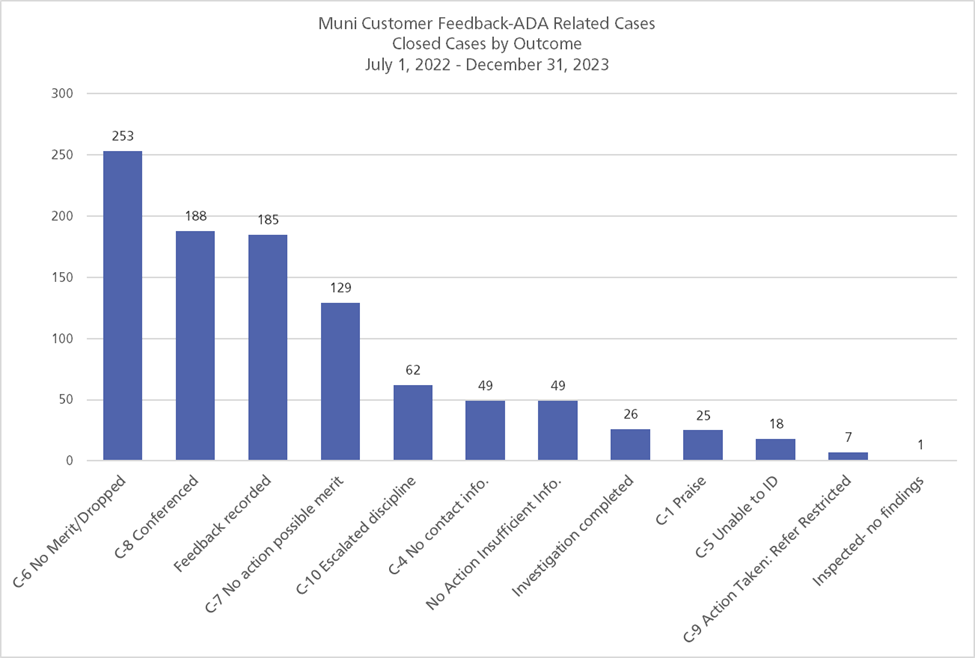Key Takeaway: Listening to input from advocacy organizations, community advisory bodies and individual riders is an important way to ensure Muni services are accessible to seniors and people with disabilities. The SFMTA should continue to work intentionally to solicit goals and identify community needs by working with existing community organizations.
Customer Feedback
General customer feedback on Muni accessibility is primarily received through the citywide 311 system or via the Mayor’s Office on Disability. The SFMTA also accepts feedback through its public outreach process, in person visits to various departments and at our Customer Service Center.
Once received, the feedback is forwarded to the appropriate department or division for resolution. Complaints are investigated and acted upon by the relevant staff within the SFMTA, and operator commendations are forwarded to the person’s supervisor so they, too, can be recognized.
The most commonly reported accessibility-related issue on fixed route is “passenger pass ups,” which means a bus was too full to allow any additional passengers to board. This complaint was also the issue most frequently reported by all passengers in FY23, reflecting the fact that our riders who are seniors and/or have a disability often make the same trips as the general public. The next most common accessibility-related complaints are “rude and discourteous behavior” from an operator and “failure to kneel the bus.”
It is the role of the Accessible Services Fixed Route Accessibility Coordinator to monitor customer feedback, respond to customer requests for reasonable accommodations and investigate accessibility-related complaints that are escalated by Customer Service and Transit Divisions.
The majority of investigations into reported ADA related complaints have resulted in a finding of “No-Merit,” which means that the operator was found to have followed all of the SFMTA’s policies and procedures. For reported incidents that were found to have merit and ended in discipline, the operator was “conferenced.” “Conferenced” is the first disciplinary step in the SFMTA’s progressive disciplinary process; indicating that in most instances, ADA-related complaints are first-time offenses and seldom a reoccurring event for individual operators.
Figure 1. Muni Customer Feedback: Top Issues Relating to Accessibility (7/2022-12/2023)

Figure 2. Muni Customer Feedback: ADA-Related Cases by Outcome (7/2022-12/2023)

Multimodal Accessibility Advisory Committee
The Multimodal Accessibility Advisory Committee (MAAC) is a body of 21 advocates that all share an interest in ensuring that SFMTA services are accessible to seniors and people with disabilities. Most members are seniors or have a disability.
The committee meets monthly and plays a significant role in advancing many of the accessibility improvements SFMTA customers enjoy today. While historically the MAAC focused on changes that impacted Muni, the committee expanded its purview to the entire agency to better reflect the multimodal nature of the SFMTA’s services.
MAAC now plays a central role in the vetting of a wide variety of the SFMTA’s plans and proposals which may have an impact on seniors and people with disabilities, including topics as:
- The Muni Forward program
- The Transit Effectiveness Project
- Bike share stations
- Commuter shuttles
- Shared Mobility programs
- Fares
- Pedestrian safety improvements
- Quick Build projects
- Vehicle and facility design
In an effort to enhance the MAAC’s impact, the committee is currently working to increase public involvement, grow membership and engage in a comprehensive goal-setting process. The committee has plans to organize a collaborative community goal-setting workshop in the fall of 2024. This workshop will be designed to prioritize key advocacy issues and establish clear, achievable objectives. This will help align the committee's efforts with community needs, ensuring more impactful and focused advocacy efforts.